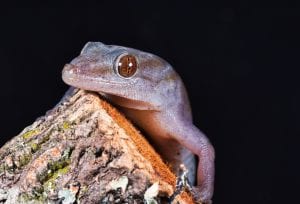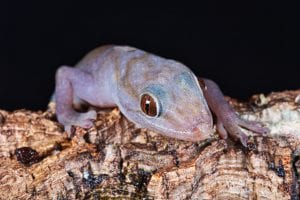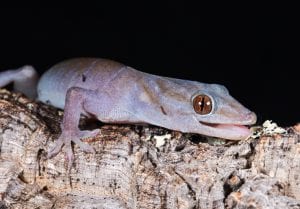Golden geckos are a nocturnal species, generally becoming active at dusk, and remaining active throughout the dark hours. They occur in lowland rainforest in Vietnam, often around human habitation – they take advantage of electric lights that attract flying insects that they consume.
This species is generally available as wild caught, and is not a species currently bred in large numbers. We always recommend that wild caught species are only kept by experienced keepers with a view to establishing breeding programmes – there are many captive bred species freely available that will suit the less experienced keeper. Having said this, the Golden gecko is an easy species to keep, and shouldn’t provide any difficulties in breeding.
They are an arboreal species, so provide a tall glass vivarium of around 60-90cm tall. The glass vivarium will hold humidity better (and last longer) – this species needs to be sprayed with tepid water a couple of times a day. Automated rain and fog systems are also available. Provide plenty of climbing branches and plants – and as a species lends itself well to a naturally planted eco-terrarium. A small water bowl can be provided but most will drink from the water drips after spraying.
 It’s important to provide overhead heating, as opposed to underfloor or side mounted heat mats. The topic of overhead heating is very debatable – we prefer to use ceramic heaters, some keepers prefer light emitting halogen or incandescent bulbs. Whichever preference is used, it’s important to use a thermostat, set at around 30C during the day, only slightly dropping at night to around 24-26C at night. This species, and many other nocturnal gecko species, have been kept for many years successfully without provision of a UVB light source. However the modern way of thinking is to provide a lower output UVB tube, of around 6{cb5d0a8cf0c44aef2db327d9ab0dba08dd09aed1126b509e5fa01d3aaa87fe47} UVB output – the Arcadia Shadedweller is ideal for this species.
It’s important to provide overhead heating, as opposed to underfloor or side mounted heat mats. The topic of overhead heating is very debatable – we prefer to use ceramic heaters, some keepers prefer light emitting halogen or incandescent bulbs. Whichever preference is used, it’s important to use a thermostat, set at around 30C during the day, only slightly dropping at night to around 24-26C at night. This species, and many other nocturnal gecko species, have been kept for many years successfully without provision of a UVB light source. However the modern way of thinking is to provide a lower output UVB tube, of around 6{cb5d0a8cf0c44aef2db327d9ab0dba08dd09aed1126b509e5fa01d3aaa87fe47} UVB output – the Arcadia Shadedweller is ideal for this species.
The Golden gecko is insectivorous, please do not purchase this species if feeding live insects concerns you at all. In your thought process keep in mind that it’s not unusual to have the odd cricket or other livefood to escape around the house. Also keep in mind that the livefood will also need to be looked after to keep it alive and more nutritionally viable. There are specially designed holding tanks, and special food for the insects (typically this is called “gutloading”) – this also passes the goodness to the geckos too. Always dust food every other day with a good quality supplement powder designed for reptile use. Again, a debatable topic, and there are many varieties of supplements. We tend to use and recommend VetArk Nutribal.
A fantastic species to keep and watch, highly recommended.
